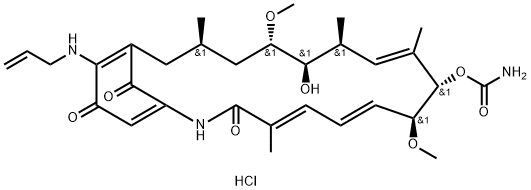17-AAG Hydrochloride is a potent HSP90 inhibitor with IC50 of 5 nM, having a 100-fold higher binding affinity for HSP90 derived from tumour cells than HSP90 from normal cells.
In Vitro:17-AAG causes the degradation of HER2, Akt, and both mutant and wild-type AR and the retinoblastoma-dependent G1 growth arrest of prostate cancer cells. 17-AAG inhibits prostate cancer cell lines with IC50s ranged from 25-45 nM (LNCaP, 25 nM; LAPC-4, 40 nM; DU-145, 45 nM; and PC-3, 25 nM)[1]. Combination of 17-AAG (10 nM) and Trastuzumab induces more effective ErbB2-degradation. 17-AAG (0.1-1 μM) induces a nearly complete loss of ErbB2 on ErbB2-overexpressing breast cancer cells[2]. 17-AAG inhibits cell growth and induces G2/M cell cycle arrest and apoptosis in CCA cells together with the down-regulation of Bcl-2, Survivin and Cyclin B1, and the up-regulation of cleaved PARP[3].
In Vivo:17-AAG (25-200 mg/kg, i.p.) causes a dose-dependent decline in AR, HER2, and Akt expression in prostate cancer xenografts. 17-AAG treatment at doses sufficient to induce AR, HER2, and Akt degradation results in the dose-dependent inhibition of androgen-dependent and -independent prostate cancer xenograft growth without toxicity[1]. 17-AAG (60 mg/kg) with paclitaxel (60 mg/kg) and rapamycin (30 mg/kg) inhibits A549 and MDA-MB-231 tumor growth far more potently than paclitaxel-containing micelles and effected tumor cures in MDA-MB-231 tumor-bearing animals by tail vein injection[4].
References:[1]. Solit DB, et al. 17-Allylamino-17-demethoxygeldanamycin induces the degradation of androgen receptor and HER-2/neu and inhibits the growth of prostate cancer xenografts.Clin Cancer Res, 2002, 8(5), 986-993.
[2]. Raja, Srikumar M., et al. A combination of Trastuzumab and 17-AAG induces enhanced ubiquitinylation and lysosomal pathway-dependent ErbB2 degradation and cytotoxicity in ErbB2-overexpressing breast cancer cells. Cancer Biology & Therapy (2008), 7(10), 163
[3]. Zhang J, et al. The heat shock protein 90 inhibitor 17-AAG suppresses growth and induces apoptosis in human cholangiocarcinoma cells.Clin Exp Med. 2012 Sep 7.
[4]. Newman B, et al. HSP90 Inhibitor 17-AAG Selectively Eradicates Lymphoma Stem Cells.Cancer Res. 2012 Sep 1;72(17):4551-61. Epub 2012 Jun 29.
[5]. Kamal A, et al. A high-affinity conformation of Hsp90 confers tumour selectivity on Hsp90 inhibitors. Nature. 2003 Sep 25;425(6956):407-10.

